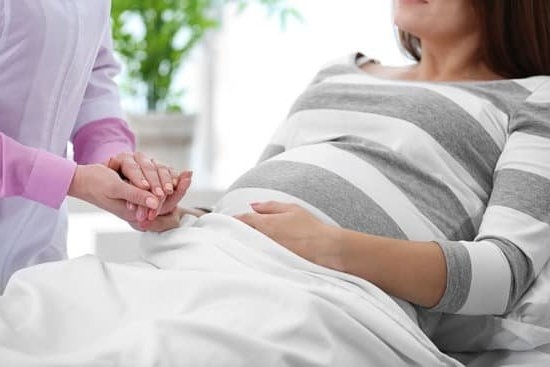Discovering the early signs of pregnancy is an exciting and often nerve-wracking time for many women. One symptom that may cause concern is itching, leading many to ask the question, “Is itching a sign of pregnancy?” In this article, we will explore the relationship between hormones and skin changes during pregnancy, common skin symptoms to expect, and whether itching is a common indicator of pregnancy.
During the early stages of pregnancy, a woman’s body undergoes numerous hormonal changes that can result in various symptoms. From morning sickness to mood swings, these signs are often well-known. However, less discussed are the potential changes in a woman’s skin due to these hormonal shifts. Itching during pregnancy can be distressing for some women and understanding its causes and management is crucial for their peace of mind.
As we delve deeper into this topic, we will uncover the common skin symptoms that women may experience during pregnancy. These could range from stretch marks to darkening of the skin in certain areas.
The focus will then shift to examining whether itching is indeed a frequent occurrence during pregnancy and what factors contribute to it. We will also discuss when it may be necessary to seek medical attention for severe or persistent itching and provide helpful tips on managing this discomfort during pregnancy.
The Relationship Between Hormones and Skin Changes During Pregnancy
During pregnancy, many women experience changes in their skin due to the hormonal fluctuations happening in their bodies. These changes can range from mild to severe and usually occur as early as the first trimester. The hormones responsible for these skin changes are estrogen and progesterone, which play a crucial role in preparing the body for pregnancy and supporting the growth and development of the fetus.
One common skin change that is often associated with pregnancy is itching. Itching is a symptom that many pregnant women experience, and it can be attributed to various factors such as stretching of the skin, increase in blood supply, hormonal changes, and pre-existing skin conditions. In some cases, itching may also be a sign of a more serious condition such as cholestasis of pregnancy, a liver disease that occurs during pregnancy.
It is important to note that not all itching during pregnancy is cause for concern, but it is essential for pregnant women to pay attention to any unusual or persistent itching and seek medical advice if necessary. Understanding the relationship between hormones and skin changes during pregnancy can help expectant mothers manage their symptoms effectively and differentiate between normal variations and potential complications.
| Hormonal Factor | Relation to Skin Changes |
|---|---|
| Estrogen | Supports increased blood flow to the skin leading to increased perspiration and oil production. |
| Progesterone | Causes relaxation of smooth muscle cells resulting in decreased production of gastric acid that can lead to acid reflux causing dermatitis. |
Common Skin Symptoms During Pregnancy
During pregnancy, many women experience a variety of skin changes as a result of hormonal fluctuations. These changes can include acne, darkening of the skin, and stretch marks. It is important for expectant mothers to understand these common skin symptoms in order to better manage and address them.
Hyperpigmentation
One common skin symptom during pregnancy is hyperpigmentation, which refers to the darkening of certain areas of the skin. This can occur on the face, abdomen, and other parts of the body. The increased production of melanin, the pigment responsible for skin color, is often the cause of this condition. Known as melasma or chloasma, this type of hyperpigmentation is also sometimes referred to as “the mask of pregnancy”.
Stretch Marks
Another prevalent skin symptom during pregnancy is the development of stretch marks. As a woman’s body undergoes significant physical changes to accommodate the growing baby, the skin may stretch beyond its usual capacity, resulting in fine lines or streaks on the abdomen, breasts, hips, and thighs.
Itching
In addition to hyperpigmentation and stretch marks, itching is a common symptom experienced by pregnant women. This itching can occur on various parts of the body and may range from mild to severe. Is itching a sign of pregnancy? Yes, it can be attributed to the hormonal changes that accompany pregnancy. However, it is essential for expectant mothers to differentiate between normal itching and more serious conditions that require medical attention.
Is Itching a Common Symptom of Pregnancy?
During pregnancy, many women experience a variety of symptoms that can be early signs of their condition. These symptoms can range from morning sickness to mood swings and can sometimes include changes in the skin. One common skin-related symptom that some pregnant women experience is itching.
Itching during pregnancy is not uncommon and can be attributed to various factors such as hormonal changes, stretching of the skin, and pre-existing skin conditions that may worsen during pregnancy. It is important for expectant mothers to understand the reasons behind itching during pregnancy and how to manage it effectively.
Causes of itching during pregnancy can vary, but some common reasons include:
- Hormonal changes: Changes in hormone levels, particularly an increase in estrogen, can lead to changes in the skin and potentially cause itchiness.
- Stretching of the skin: As the belly expands to accommodate a growing baby, the skin stretches which can result in itchiness.
- Pre-existing skin conditions: Women who have pre-existing skin conditions like eczema or psoriasis may find that their symptoms worsen during pregnancy.
When experiencing itching during pregnancy, it is essential to know when to seek medical attention. In some cases, itching may be a sign of a more serious condition such as cholestasis, which is a liver problem that occurs during pregnancy. If the itching is severe or persistent, it is important to consult with a healthcare provider for proper evaluation and guidance on managing this symptom.
Causes of Itching During Pregnancy
During pregnancy, many women experience changes in their skin due to hormonal fluctuations. One common symptom that some pregnant women may experience is itching. This symptom can be quite bothersome, but it is essential to understand the underlying causes of itching during pregnancy.
One potential cause of itching during pregnancy is an increase in blood flow to the skin. This increased blood flow can lead to various skin changes, including itchiness. Additionally, the stretching of the skin as the baby grows can also contribute to itchiness. These physical changes can lead to dry and irritated skin, especially around the abdomen, breasts, and thighs.
Another common cause of itching during pregnancy is a condition known as pruritic urticarial papules and plaques of pregnancy (PUPPP). This condition typically occurs in the third trimester and is characterized by itchy red bumps and hives on the abdomen. While PUPPP is not harmful to the baby, it can be extremely uncomfortable for the mother.
In some cases, itching during pregnancy may be a sign of a more serious condition such as intrahepatic cholestasis of pregnancy (ICP). ICP is a liver disorder that occurs during pregnancy and is characterized by severe itching, particularly on the palms of the hands and soles of the feet. This condition requires medical attention as it can pose risks for both the mother and baby if left untreated.
| Possible Causes of Itching During Pregnancy | Description |
|---|---|
| Increased blood flow | This may lead to dry and irritated skin |
| Pruritic urticarial papules and plaques of pregnancy (PUPPP) | Characterized by itchy red bumps and hives on the abdomen |
| Intrahepatic cholestasis of pregnancy (ICP) | A liver disorder characterized by severe itching on hands and feet |
When to Seek Medical Attention for Itching During Pregnancy
Itching during pregnancy can be common, but in some cases, it can signal a more serious issue that requires medical attention. It’s important to know when to seek help from a healthcare provider to ensure the health and safety of both the mother and the baby. Here are some red flags that indicate when it’s time to seek medical attention for itching during pregnancy:
- Intense or severe itching that is not relieved by over-the-counter remedies: If the itching becomes unbearable and is not alleviated by using moisturizers or taking oatmeal baths, it may be a sign of a more serious underlying condition such as cholestasis.
- Jaundice or yellowing of the skin and eyes: This can be a symptom of cholestasis, a liver condition that sometimes accompanies pregnancy. If you notice any yellowing of the skin or eyes along with itching, it’s crucial to consult with a healthcare provider immediately.
- Dark urine and pale stools: These are also signs of cholestasis and should not be ignored. Any changes in urine color or stool consistency should be reported to a healthcare provider as soon as possible.
It’s essential for pregnant women experiencing intense itching to communicate with their healthcare providers if they have any concerns about their symptoms. Seeking prompt medical attention can help address any potential issues early on and ensure the best possible outcome for both mother and baby.
Tips for Managing Itching During Pregnancy
During pregnancy, many women experience itching due to the changes happening in their body. This can be uncomfortable and distressing, but there are several tips for managing itching during pregnancy that can help alleviate this symptom.
Use Mild, Fragrance-Free Soaps and Lotions
Switching to mild, fragrance-free soaps and lotions can help reduce irritation on the skin. Harsh chemicals and fragrances can exacerbate itching, so opt for products specifically designed for sensitive skin or those labeled as hypoallergenic.
Avoid Hot Showers and Baths
Hot water can strip the skin of its natural oils, leading to dryness and itching. Opt for lukewarm water when showering or bathing, and try to keep your time in the water to a minimum.
Keep Your Skin Moisturized
Moisturizing regularly with a gentle, hypoallergenic lotion can help soothe itchy skin. Applying moisturizer after bathing while the skin is still damp can also help lock in moisture.
It’s important to note that while these tips may provide some relief for mild itching during pregnancy, it’s always best to consult with a healthcare provider if the itching becomes severe or is accompanied by other concerning symptoms.
Other Potential Reasons for Itching During Pregnancy
When experiencing itching during pregnancy, it’s important to consider other potential reasons beyond just the normal physiological changes that occur during this time. One possible reason for itching during pregnancy is the development of a skin condition such as eczema or dermatitis. These conditions can be aggravated by hormonal changes and may result in intense itching and discomfort.
Another potential cause of itching during pregnancy is the presence of cholestasis, a liver condition that occurs specifically during pregnancy. Cholestasis can lead to itching, particularly on the hands and feet, and may also be accompanied by other symptoms such as dark urine and pale-colored stools. This condition requires medical attention as it can pose risks to both the mother and the unborn baby.
In some cases, pre-existing skin conditions such as psoriasis or hives may flare up during pregnancy due to hormonal changes and increased stress on the body. It is crucial for pregnant women experiencing persistent or severe itching to consult with their healthcare provider in order to determine the underlying cause and receive appropriate treatment.
Conclusion
As we’ve explored in this article, understanding the early signs of pregnancy can be crucial for expecting mothers. One of the common symptoms that some women experience is itching, which may be caused by hormonal changes and other factors related to pregnancy. While itching is a normal occurrence for many pregnant women, it’s important to be aware of when it might indicate a more serious issue that requires medical attention.
The relationship between hormones and skin changes during pregnancy cannot be understated. As the body adjusts to accommodate the growing fetus, fluctuating hormone levels can lead to a range of skin symptoms, including itching. This is why it’s essential for pregnant women to be well-informed about common skin symptoms during pregnancy and understand when itching may necessitate seeking medical advice.
In conclusion, while itching is a common symptom of pregnancy and often nothing to worry about, it’s crucial for expectant mothers to stay vigilant and consult their healthcare provider if they experience persistent or severe itching. By being proactive and informed about potential causes and management strategies for itching during pregnancy, women can navigate this aspect of their prenatal experience with confidence and peace of mind.
Frequently Asked Questions
Is Itching a Sign of Early Pregnancy?
Itching can indeed be a sign of early pregnancy, specifically itching on the breasts and abdomen due to the skin stretching as the body prepares for the baby.
What Week Does Itching Start in Pregnancy?
Itching in pregnancy can start as early as the first trimester, around week 8 to week 12, and may continue throughout the pregnancy. It is important to address any excessive itching with a healthcare provider.
What Are First Signs Your Pregnant?
The first signs of pregnancy can include missed periods, fatigue, nausea or vomiting (morning sickness), frequent urination, breast changes such as tenderness or swelling, and mood swings. It’s important to take a pregnancy test or consult with a healthcare provider for confirmation.

Welcome to my fertility blog. This is a space where I will be sharing my experiences as I navigate through the world of fertility treatments, as well as provide information and resources about fertility and pregnancy.





